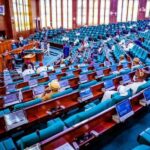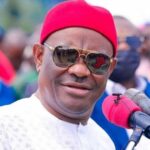President Bola Tinubu has paid a glowing tribute to the late founding President of the Republic of Namibia, Dr. Sam Shafiishuna Nujoma, describing him as a warrior who united Nigeria and other African nations in the fight for his country’s freedom.
Speaking on Saturday during a state burial for the late Namibian leader at Heroes’ Acre, Windhoek, Namibia, President Tinubu noted that Dr. Nujoma’s passing is not merely an exit from space and time but the beginning of his immortality in the minds of Africans.
He was represented by his deputy, Vice President Kashim Shettima.
The late Nujoma, a revered figure who led Namibia to independence and guided the nation towards democracy and stability, passed away on February 8, 2025, at the age of 95. He died at a hospital in Windhoek, where he had been receiving treatment for weeks due to an illness.
Shettima, alongside several African heads of government, joined President Nangolo Mbumba of Namibia at the state burial, where he paid Nigeria’s final respects—on behalf of President Tinubu—to the late Nujoma.
ALSO READ: Reps unhappy over FCT Area Councils’ primary healthcare budget performance
According to a statement by Stanley Nkwocha, the Vice President’s spokesman, in his speech delivered by Shettima, President Tinubu eulogized the esteemed African statesman, describing him as not just a national hero but a warrior who defied oppression and inspired an entire continent.
He stated:
“We have not come to this sacred ground to bury a man. We have come to enshrine a legacy. We have come to salute a life that was lived not for itself, but for the people, for the land, for the ideals of freedom. For him, Africa stands still today.
“Dr. Sam Shafiishuna Nujoma was not just the founding father of a nation in need of a hero; he was a warrior in an age of chains. He stared oppression in the face at a time when doing so was most dangerous and declared that no African shall ever be a second-class citizen on his own soil.”
President Tinubu commended Nujoma’s leadership beyond independence, noting that he rebuilt Namibia from the ashes of occupation and ruled selflessly for his people.
“But even after victory, you did not rest. Independence was not the destination; it was only the beginning. You built this nation from the ashes of occupation. You turned resistance into governance, turned a dream into reality. You did not rule for yourself; you ruled for your people. You sacrificed your comfort for the freedom, dignity, and justice of all Namibians,” he noted.
Acknowledging Nujoma’s legacy, which he said transcends time, the Nigerian leader declared that he now lives on in Namibia’s freedom and Africa’s collective history.
He highlighted Nigeria’s support for Namibia’s liberation struggle, stressing that the bond between the two nations was forged in the fight against apartheid and colonial rule.
His words:
“Nigeria was not a bystander in the Namibian struggle. When the world turned its back, we stood. When your voice was drowned out by the guns of apartheid, we spoke.
“When your hands were tied, we reached out. We did not do this as charity. We did not do this as a favour. We did this because your struggle was our struggle. Your pain was our pain. Your freedom was our freedom.”
President Tinubu reassured the people of Namibia of Nigeria’s unwavering solidarity, emphasizing that the struggle that once united both countries has become the foundation of an unbreakable friendship.
The Nigerian leader added:
“Nigeria is here today not only to honour you but to remind the world that the bond between our nations is unbreakable. That the struggle that brought us together is now the foundation of a friendship that will never fade.
“Namibia, you do not grieve alone. Africa grieves with you. The free world grieves with you. But more than that, we celebrate you. Because in this land, in this soil, we did not just lose a man—we gained a legend.”
The burial was also attended by the Presidents of South Africa, Matamela Cyril Ramaphosa; Zimbabwe, Emmerson Mnangagwa; the Democratic Republic of Congo, Félix Tshisekedi; Tanzania, Samia Suluhu Hassan; Malawi, Lazarus Chakwera; and Ghana, John Mahama, as well as several former presidents and heads of diplomatic missions.






